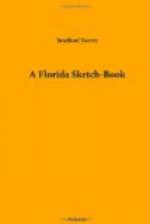These anglers were to be congratulated. Ordered South by their physicians,—as most of them undoubtedly were,—compelled to spend the winter away from friends and business, amid all the discomforts of Southern hotels, they were happy in having at least one thing which they loved to do. Blessed is the invalid who has an outdoor hobby. One man, whom I met more than once in my beach rambles, seemed to devote himself to bathing, running, and walking. He looked like an athlete; I heard him tell how far he could run without getting “winded;” and as he sprinted up and down the sand in his scanty bathing costume, I always found him a pleasing spectacle. Another runner there gave me a half-hour of amusement that turned at the last to a feeling of almost painful sympathy. He was not in bathing costume, nor did he look particularly athletic. He was teaching his young lady to ride a bicycle, and his pupil was at that most interesting stage of a learner’s career when the machine is beginning to steady itself. With a very little assistance she went bravely, while at the same time the young man felt it necessary not to let go his hold upon her for more than a few moments at once. At all events, he must be with her at the turn. She plied the pedals with vigor, and he ran alongside or behind, as best he could; she excited, and he out of breath. Back and forth they went, and it was a relief to me when finally he took off his coat. I left him still panting in his fair one’s wake, and hoped it would not turn out a case of “love’s labor’s lost.” Let us hope, too, that he was not an invalid.
While speaking of these my companions in idleness, I may as well mention an older man,—a rural philosopher, he seemed,—whom I met again and again, always in search of shells. He was from Indiana, he told me with agreeable garrulity. His grandchildren would like the shells. He had perhaps made a mistake in coming so far south. It was pretty warm, he thought, and he feared the change would be too great when he went home again. If a man’s lungs were bad, he ought to go to a warm place, of course. He came for his stomach, which was now pretty well,—a capital proof of the superior value of fresh air over “proper” food in dyspeptic troubles; for if there is anywhere in the world a place in which a delicate stomach would fare worse than in a Southern hotel,—of the second or third class,—may none but my enemies ever find it. Seashell collecting is not a panacea. For a disease like old age, for instance, it might prove to be an alleviation rather than a cure; but taken long enough, and with a sufficient mixture of enthusiasm,—a true sine qua non,—it will be found efficacious, I believe, in all ordinary cases of dyspepsia.




